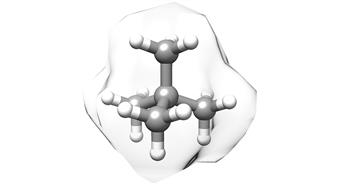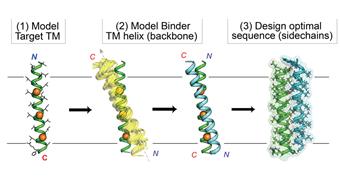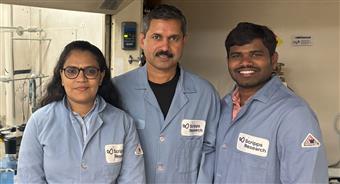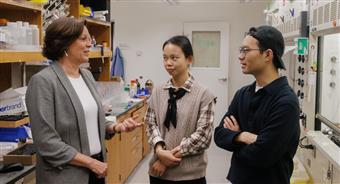
Targeting muscle cells' insulin receptors allows more efficient gene therapy Method could allow significant dosage reduction, addressing key concerns, scientists find.
December 30, 2020
JUPITER, FL The potential for gene therapy to address genetic diseases is immense, but several challenges have held up progress. Improving the efficiency of the gene delivery system could be a viable way to resolve many of them, says Scripps Research, Florida virologist Hyeryun Choe, PhD.
In a paper published in the open access journal Molecular Therapy: Methods & Clinical Development, Choe and colleagues report a more productive method of introducing therapeutic genes: by programming the gene therapy vector to seek out muscle cells, via abundant insulin receptors displayed on the surface of those cells.
The most-studied method of gene therapy has issues of excessive cost and high dose-associated toxicity risks, Choe explains. Lowering the dose needed to bring about the desired treatment should ease both problems, she explains. To accomplish this, Choe and graduate trainee Cody Jackson sought to engineer a viral gene delivery system to target muscle cells. They reasoned that muscle cells' longevity, among other traits, would make them the best cells for the job.
Muscle cells don't divide, so you have them for your whole life, Choe says.
One of the ways scientists administer therapeutic genes is by engineering viruses to deliver them into cells. They start with a benign virus, such as the adeno-associated virus, or AAV, which doesn't replicate in humans, and reengineer its genome to carry the genetic payload needed to treat or prevent disease.
The virus can be altered to display a protein fragment perfectly structured to bind to a desired cell receptor, so that it unlocks entry to a specific cell type, like a key made for one specific type of lock. The next challenge Choe's team faced was to identify the most promising receptor on muscle cells, and find the right peptide or protein fragment, that would bind tightly to that receptor.
The protein fragment that Choe's team identified recognizes muscle cells' insulin receptors with high affinity, explains Jackson. They found the introduction of that insulin-mimetic peptide boosted the efficiency of vector uptake by nearly twentyfold compared to standard methods, thus allowing a significantly lower dose of the therapeutic virus to deliver a gene of interest. It showed that muscle cells are very good targets for gene therapy, says Jackson.
Something unique about muscle tissue is its capillary network. It allows the proteins produced there to easily diffuse into the blood, Jackson explains. This platform could be used for any disease where you want the protein to be circulating throughout the body, systemically.
They checked whether the use of a vector targeting insulin receptor could impact the blood sugar of treated animals. Testing proved it did not, he adds.
The U.S. Food and Drug Administration has so far approved gene therapies for an eye condition that causes congenital blindness, and a genetic disease called spinal muscular atrophy. The treatments are life-changing, but can cost between $500,000 and $2 million per patient.
With enhanced efficiency, doses can be lowered, and with lowered doses, costs and toxicity-related adverse events can be reduced, Choe says.
Choe says the insulin receptor-targeting strategy is useful for another reason. Because the insulin receptor they targeted is conserved across multiple animal species, the potential new therapies can easily be evaluated in laboratory animals.
It's clear that targeting muscle cells via insulin receptors represents an important improvement in gene therapy technology, and offers potential routes to address both genetic and infectious diseases, such as HIV, for which neutralizing antibodies are often produced via an intramuscular delivery of an AAV vector, says Choe.
This approach worked like a charm, she says.
Jackson's work on the study earned him the cover image for the scientific journal. Conducted as part of his PhD thesis project, it also helped him become the first student to complete his doctorate through the joint MD/PhD program offered cooperatively by the Scripps Research, Florida branch of the Skaggs Graduate School of Chemical and Biological Sciences, and Florida Atlantic University's Charles E. Schmidt College of Medicine.
The rigorous joint-degree program demands real commitment, Jackson acknowledged. It requires a bachelor's degree plus two years of medical school coursework, followed by four to five years of doctoral studies in Scripps Research labs. But that's not the end of it. Another two years of clinical rotations are required to earn the white coat and the letters MD. He'll start his clinical rotations this spring.
I am hoping that completing the training in both programs means the opportunities will be open for me to do clinical practice, or research, or both, Jackson says.
Skaggs Graduate School Associate Dean Christoph Rader, PhD, praised Jackson's hard work and impact.
We were fortunate to recruit Cody Jackson to our joint MD/PhD program. His dedication and drive have been outstanding, Rader says. As our first graduate, he will always be remembered.
In addition to Jackson and Choe, the study's authors include Michael Farzan, Audrey Richard and Amrita Ojha of Scripps Research; Kimberly Conkright, Jeffrey Trimarchi, Charles Bailey and Michael Alpert of Emmune, Inc.; and Mark Kay of Stanford University.
This study was supported by grants from the National Institutes of Health, including R37 AI091476, R44 AI134269 and R44 TR003501.
Immunology & Microbiology Choe, Hyeryun
More from Scripps
20/04/2024
New copper-catalyzed C-H activation strategy from Scripps Research Two-mode reactions inspired by human detox enzymes offer powerful new tools for drug discover...
12/04/2024
Scripps Research chemists devise easier new method for making a common type of building block for drugs Scientists transform simple linear amines into saturated...
06/04/2024
A simple, inexpensive way to make carbon atoms bind together A Scripps Research team uncovers a cost-effective method for producing quaternary carbon molecules,...
04/04/2024
Developing a vaccine for the zombie drug xylazine Scripps Research chemical biologists design an early proof-of-concept vaccine that could lead to the first...
30/03/2024
How blocking a neural receptor responsible for addiction could reduce alcohol use A Scripps Research team found that a new therapeutic that targets the kappa op...
13/03/2024
New computational strategy boosts the ability of drug designers to target proteins inside the membrane Customized-design approach could streamline the design of...
29/02/2024
Scripps Research scientists reveal how first cells could have formed on Earth New phospholipid discovery brings researchers closer to understanding how primordi...
29/02/2024
How molecular handedness emerged in early biology Scripps Research chemists fill a major gap in origin-of-life theories.
February 28, 2024
LA JOLLA, CA Mole...
22/02/2024
Snaking toward a universal antivenom Scripps Research scientists discovered antibodies that protect against a host of lethal snake venoms.
February 21, 2024
...
06/02/2024
Calibr-Skaggs announces expansion of option and license agreement with AbbVie to develop novel cell therapies for solid tumors and autoimmune diseases
AbbVie...
26/01/2024
Re-energizing mitochondria to treat Alzheimer's disease Scripps Research team restored neuron-to-neuron connections in human cells.
January 25, 2024
LA JO...
24/01/2024
100 years of Science Changing Life: Scripps Research celebrates a century of transforming human health For the last century, institute leaders and renowned scie...
23/01/2024
New technology lets researchers track brain cells' off switches The method could shed light on what goes awry in numerous brain conditions when neurons ar...
09/01/2024
Three decades of giving: Announcing the Calibr-Skaggs Institute for Innovative Medicines The ALSAM Foundation, founded by the Skaggs family, provides lasting g...
04/01/2024
Life science entrepreneur Gene Lay joins Scripps Research Board of Directors Lay, founder of the global biotech company BioLegend, brings invaluable experience ...
21/12/2023
Taming a plant-derived toxin Scripps Research team modifies the traditional poison picrotoxinin for potential neurological drugs and anti-parasite treatments. ...
19/12/2023
Scripps Research Executive Vice President Eric Topol gives TED talk on transformative power of AI in medicine Topol provides an overview of how AI models can i...
13/12/2023
New AI-powered algorithm could better assess people's risk of common heart condition Early detection of atrial fibrillation can reduce the risk of stroke an...
07/12/2023
Nanoparticle flu vaccine design shows promise in early tests Scripps Research-designed vaccine could provide broad, enduring protection against influenza A str...
16/11/2023
Numerous Scripps Research scientists named Highly Cited Researchers Clarivate's annual, global list represents researchers who have demonstrated significant...
07/11/2023
Multiple sclerosis drug invented at Scripps Research slows long-term devastating disease progression Late-breaking data reinforces the effectiveness and safety ...
05/10/2023
Keren Lasker named a 2023 Moore Inventor Fellow The prestigious award will support Lasker's inventive research in membraneless organelles and their applica...
22/09/2023
Michael Bollong named a 2023 Amgen Young Investigator The prestigious award will support Bollong's research identifying new molecular targets and therapeuti...
09/09/2023
Philip Dawson receives 2024 American Chemical Society National Award Dawson is honored with the Arthur C. Cope Late Careers Scholar Award for his foundational c...
07/09/2023
Scripps Research chemists devise a method for C-H activation of alcohols The method represents a new toolkit for making drugs and other compounds.
September 06...
31/08/2023
Scripps Research receives $1.5M to surveil infectious disease threats in wastewater Bill & Melinda Gates Foundation award to support the development of multi-pa...
16/08/2023
How cold temperatures trigger the brain to boost appetite Scripps Research scientists' discovery could lead to new weight loss and metabolic health treatmen...
08/08/2023
Human antibody that targets carfentanil, fentanyl and related opioids reverses overdose effects in preclinical study Scripps Research-developed antibody therapy...
04/08/2023
How sensory neurons impact the gut Scripps Research scientists show that the receptor PIEZO2 in sensory neurons controls gut motility and transit time, which a...
26/07/2023
AbbVie and Calibr Expand Strategic Collaboration to Advance Several Preclinical and Early-stage Clinical Assets The expanded strategic collaboration will advan...
23/07/2023
Scripps Research scientists develop AI-based tracking and early-warning system for viral pandemics Machine-learning system effectively predicts emergence of pro...
19/07/2023
Monitoring T cells may allow prevention of type 1 diabetes Scripps Research study shows that analyzing T cells in blood samples could be used to select at-risk ...
19/07/2023
Scripps Research mourns passing of leading organic chemist Albert Eschenmoser Eschenmoser pioneered key reactions in synthetic chemistry and shaped the understa...
15/06/2023
Scripps Research awarded $46.8 million by NIH to promote human health through innovative translational science and training The Translational Institute is harne...
13/06/2023
Scripps Research's Danielle Grotjahn named 2023 Pew Scholar in the Biomedical Sciences The award will support Grotjahn's study of how cells assemble the...
31/05/2023
Crossing the ring: new method enables C-H activation across saturated carbocycles Scripps Research chemists add another powerful tool to their molecular editin...
24/05/2023
Scripps Research develops behind-the-scenes tool for better biomedical data discovery The new resource makes datasets more discoverable for life science communi...
19/05/2023
Scripps Research neuroscientist Hollis Cline elected to American Academy of Arts and Sciences Cline is recognized for her discoveries about the role of sensory ...
19/05/2023
Scripps Research's Skaggs Graduate School awards doctoral degrees to 31st graduating class Commencement ceremony will be livestreamed via Zoom and on instit...
13/05/2023
A better route to benzocyclobutenes, sought-after building blocks for drugs Scripps Research chemists devise a new, C-H activation-based method for the synthesi...
09/05/2023
Renowned Scripps Research professor Jeffery Kelly elected to National Academy of Sciences Kelly's groundbreaking work on protein misfolding has led to thera...
28/04/2023
Mirror-image molecules pave new path for cancer drug discovery By comparing how mirror image versions of small molecules impact clusters of proteins, Scripps R...
22/04/2023
How alcohol consumption contributes to chronic pain A Scripps Research team showed how both alcohol intake and alcohol withdrawal can lead to increased pain and...
21/04/2023
Xin Jin receives dual awards to study autism risk genes in neurodevelopment Major grants from the National Institutes of Health and California Institute for Reg...
20/04/2023
Trim the sugar: New HIV vaccine design improves immune response Scripps Research vaccine candidate headed for clinical trials.
April 19, 2023
LA JOLLA, CA A...
18/04/2023
Therapeutic can seek and destroy potent opioid to treat overdoses Scripps Research chemists developed a new biologic to work against the synthetic opioid carfen...
07/03/2023
How heavy alcohol consumption increases brain inflammation The findings by a Scripps Research team point toward a potential new drug target for treating alcohol...
02/03/2023
Scientists find human antibodies that can block multiple coronaviruses including SARS-CoV-2 Results from a Scripps Research and UNC team pave the way for a vacc...
28/02/2023
$10 million grant funds Scripps Research Alcohol Research Center through its 50th year The five-year grant supports research into the neurobiology of alcohol us...
28/02/2023
Immune system drug shows promise in treating alcohol use disorder, a Scripps Research clinical trial reports Scientists at Scripps Research found that apremilas...
 Targeting muscle cells' insulin receptors allows more efficient gene therapy Method could allow significant dosage reduction, addressing key concerns, scientists find.
Targeting muscle cells' insulin receptors allows more efficient gene therapy Method could allow significant dosage reduction, addressing key concerns, scientists find.

























